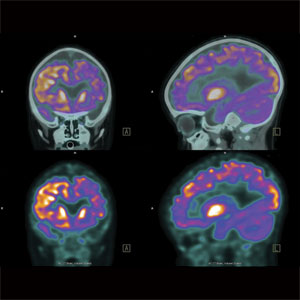PET/CT scan or Positron Emission Tomography is a glucose (sugar) scan. That is to say, it is a scan that shows where glucose is being used by the body. The CT part of the scan improves the image quality for Synergy Radiology Associates’ board-certified radiologist by adding more detail about the location of the findings within the body. The PET portion of the study requires an injection of glucose tagged with a radioactive tracer. After a 45 to 60 minute delay, the PET scan is performed in a doughnut-shaped machine that looks something like a CT scanner. The CT scan is performed on the same machine at the same time. A computer fuses the PET and CT images together for viewing and interpretation by our radiologist.
PET/CT scans are used to find tumors. They may help in diagnosing tumors or checking the extent of the spread of a tumor. They may also tell how well a tumor is responding to treatments. Most tumors use more than twice as much glucose as normal tissues like muscle, bone, skin, and fat.
PET/CT scans can also be used to evaluate the brain for seizure disorders, tumors, memory problems and infection. The risk of injury from the dose of administered radioactive material is very low. No significant adverse effects of diagnostic levels of injected radioactive materials have been reported over decades of use.
Synergy Radiology Associates offers PET/CT services at many of the 20+ locations we work out of throughout the Houston area including Katy, The Woodlands, Cypress, Humble and Friendswood, TX. Call the individual location to schedule or ask your primary care physician for a referral.
How do I prepare for my PET/CT scan?
You will receive special instructions when you schedule for your exam at one of the 20+ facilities we work out of in the greater Houston area. You will be expected not to eat or drink types of foods containing glucose for several hours before the exam. It is important not to participate in any sort of vigorous exercise prior to your exam. If you are a diabetic you may receive additional instructions. Be sure to bring a list of your medications to your exam.
If you are possibly pregnant or breastfeeding you should inform your referring physician and the technologist at the time of the exam. PET/CT scans can have effects on breast milk and should be discussed with your physician, prior to the exam.
60 minutes prior to your exam, a small amount of radioactive tracer (glucose) will be injected through a vein in your arm. Once the radioactive tracer has had time to process, you will be scanned using a “doughnut” shaped machine that looks similar to a CT scanner. The scan itself takes just a few minutes to complete.

